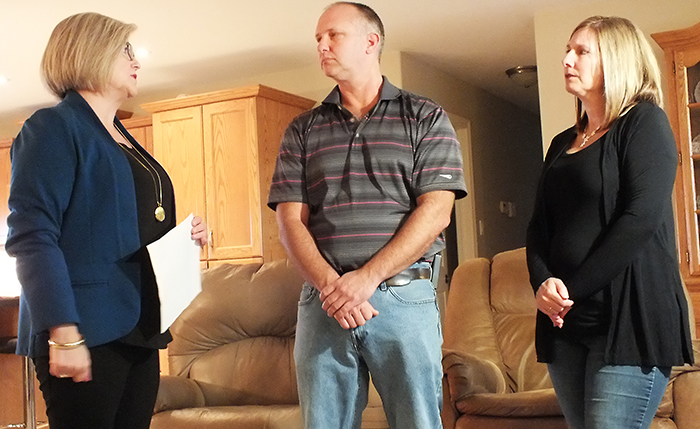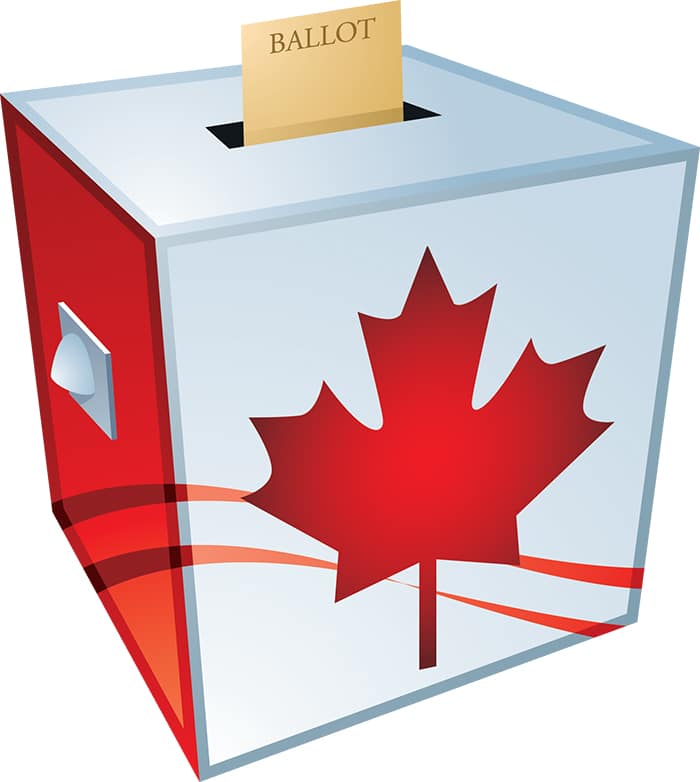
By Pam Wright
Special to The Voice
Scot and Cheryl Ryckman would like to double the size of their Highgate-area quail farm.
But they can’t. Sky-high hydro bills are crippling their expansion plans.
“This is lost business for the province,” a frustrated Scot said at the couple’s Nipissing Game Farm recently.
It’s also threatening the Rycksman’s dream of passing the family business onto their two young children.
“We love the rural life and we’d love them to take it over,” Cheryl explained.
NDP leader Andrea Horwath got a firsthand look at the Ryckman’s plight last week as part of a provincial tour to examine the effects of skyrocketing electricity bills on rural Ontario.
If elected in 2018, Horwath has promised an electricity rate rollback of 30 per cent.
Horwath says farmers like the Ryckmans are in dire need of relief from skyrocketing power charges.
The Ryckmans paid $6,862 for electricity last month, up from $1,936 in February 2014.
The fee for actual power used amounts to only about a third of the bill.
The electricity bill totals are staggering. In 2016, the game farm’s power bill for the entire year was a whopping $77,600, mushrooming from $26,400 just two years prior.
Horwath says it’s a classic example of what’s happening across rural Ontario.
“All around the province, people can’t pay their bills,” Horwath explains. “Farmers are being threatened … this is not sustainable.”
Kathleen Wynne’s Liberals are squarely to blame, the leader notes. The government’s support for the 2009 Green Energy Act — along with privatizing 30 per cent of publically owned Hydro One — has created a costly nightmare in Ontario.
The Ryckmans agree.
The farm — which processes close to 2.5 million birds per year — is the sole Canadian producer and is doing a brisk business in the U.S. and Canada.
“We’re selling into mid-June,” Cheryl said, adding they would like to increase production, but those are “extra costs I just can’t incur right now.”
Additionally, Cheryl Ryckman says, Nipissing Game Farm is the only Health Canada sanctioned quail plant in the country.
It’s also the only operation to produce Halal meat for the burgeoning Islamic population.
Quail is considered a Muslim delicacy and is extremely popular for holidays and special occasions.
The Halal meat tradition dictates the birds must be killed by a fellow Muslim using a customized cutting method.
Cheryl says the company can’t meet the demand, even though they’ve raised prices to combat the electricity overhead.
“We could double our Halal sales,” she explains, but “all of our funds are going to hydro.”
With close to 80 full and part-time workers, Nipissing is a major employer in east Chatham-Kent. Cheryl says another 30-40 jobs could be added if the Ryckmans could expand.
It’s not like they haven’t tried to cut costs. Scot has spent $30,000 on state-of-the-art equipment, and while he’s managed to drop usage by 40 per cent, the bill continued to climb.
“Everything is brand new,” Scot says of the processing plant that was updated only two years ago.
“We’ve done as much as we can do.”
Rural Ontarians have been put at a distinct disadvantage, Horwath said. Unlike their urban counterparts, they must pay fees to deliver power.
Add-on fees are another problem, she explains, as consumers must pay a global adjustment charge.
The adjustment charge serves to fund Green Energy contracts, Horwath says, leaving hydro customers on the hook subsidizing private hydro producers, well above the actual cost of producing the electricity.
For the Ryckman’s, the global adjustment charge comprised nearly $2,500 on their latest bill and delivery costs were approximately $2,000.
Horwath says an NDP government would bring the kilowatt per hour rate down to 10.3 cents, as opposed to the current inflated 18-cent price tag.
The NDP would also reverse the privatization of Hydro One, and break current Green Energy contracts, paying them out if necessary.
According to Horwath, her party will also stop the excess production of hydro in the province, to halt the sale of power to out-of-province that are getting it at bargain basement rates.
Horwath says high hydro rates are damaging Ontario’s future.
“People are feeling they’re not able to build a good life here anymore. Hydro isn’t a luxury,” she said. “People need it to survive.”
In an ironic turn of events, on the same day Horwath visited Chatham-Kent, the Wynne government announced it a 25-per-cent cut to hydro rates.
Its plan is to cut hydro rates by 17 per cent; in addition to the eight per cent HST rebates which took effect in January.
However, the cuts mean the government will be facing a large increase in interest payments on its generation contracts, extending them over a longer period.
Horwath says the plan comes up short and that the government is simply delaying payments it have to make eventually.






